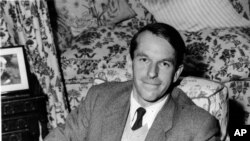LONDON —
Fred Sanger, a double Nobel Prize-winning British biochemist whose work pioneered research into the human genome, has died at the age of 95, the University of Cambridge said on Wednesday.
Sanger, who once described himself as “just a chap who messed about in his lab”, worked with colleagues to develop a rapid method of DNA sequencing - a way to “read DNA” - which became the forerunner for the work on mapping the human genome.
He won his first Nobel Prize for Chemistry in 1958 for work on determining the structure of insulin, and the same Nobel 22 years later for his work on DNA, the material that carries all the information about how living things look and function.
Colin Blakemore, a Cambridge professor of neuroscience and philosophy said Sanger was “a real hero of twentieth-century British science”, adding it was “impossible to exaggerate” the impact of his work on modern biomedical science.
“His invention of the two critical technical advances - for sequencing proteins and nucleic acids - opened up the fields of molecular biology, genetics and genomics,” he said in a statement responding to news of Sanger's death.
Sanger, who once described himself as “just a chap who messed about in his lab”, worked with colleagues to develop a rapid method of DNA sequencing - a way to “read DNA” - which became the forerunner for the work on mapping the human genome.
He won his first Nobel Prize for Chemistry in 1958 for work on determining the structure of insulin, and the same Nobel 22 years later for his work on DNA, the material that carries all the information about how living things look and function.
Colin Blakemore, a Cambridge professor of neuroscience and philosophy said Sanger was “a real hero of twentieth-century British science”, adding it was “impossible to exaggerate” the impact of his work on modern biomedical science.
“His invention of the two critical technical advances - for sequencing proteins and nucleic acids - opened up the fields of molecular biology, genetics and genomics,” he said in a statement responding to news of Sanger's death.





